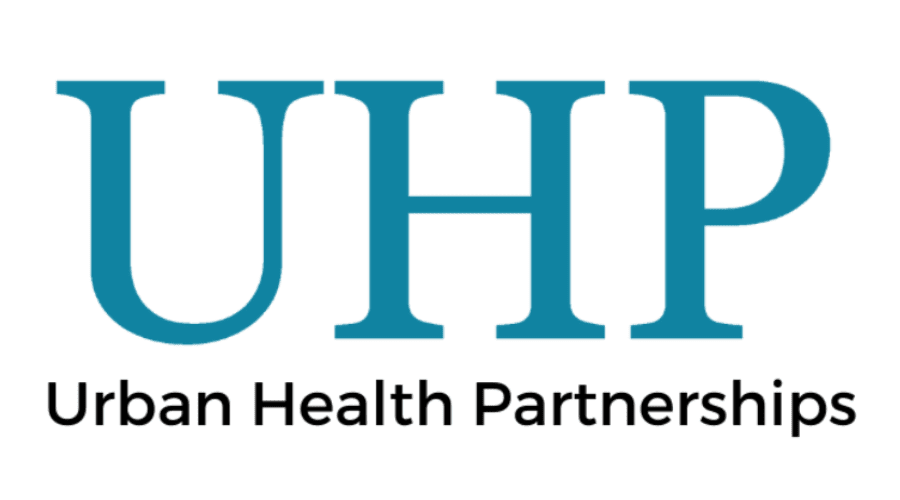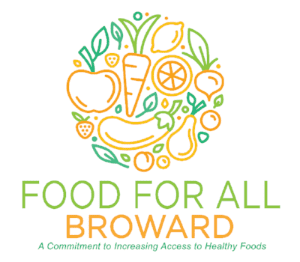
About Food for All Broward
Food for All Broward is an initiative to expand access to healthy foods for residents of all ages, abilities, cultural and economic backgrounds. By collaborating with local municipalities over the next year, the aim is to increase healthy eating options by co-developing policy and system changes that will facilitate healthier, thriving communities by strengthening and expanding the food system across Broward County.
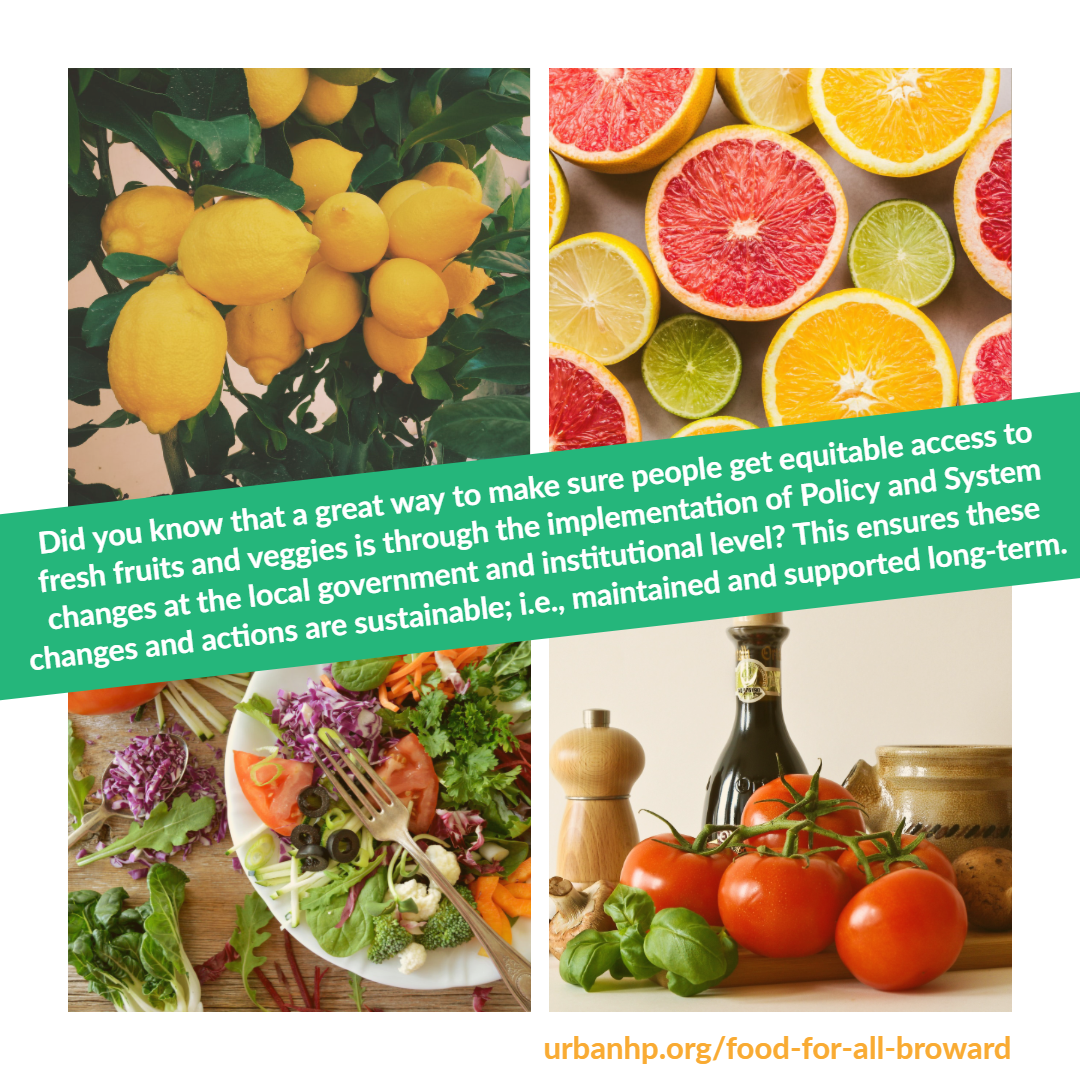
Solution-Building through Food for All Broward
By working together, we can improve the health and quality of life of all residents through proven and creative ways that local governments have used across the country to make healthy foods more affordable and accessible.
About the Funder
The mission of Health Foundation of South Florida is to invest in and be a catalyst for collaborations, policy and systems change that improves the health of South Florida communities, with a focus on vulnerable, low to moderate income populations. Established in 1993, the nonprofit foundation has awarded over $125 million to nonprofits providing programs and services in Broward, Miami-Dade and Monroe Counties. For more information, visit hfsf.org and follow @HealthSFL.
Food Access and Distribution Sites in Broward
Free Meals for Children:
• Broward County Schools Lunch Distribution Information
• Search for free Meals for Kids in Miami-Dade, Broward, and Palm Beach Counties
Food Distribution for Children and Families:
• Find a Food Distribution Site Hosted by Feeding South Florida (As noted by the website, this changes frequently and may have some cancellations)
• Find a Drive-thru Only Food-Drive Hosted by Farm Share (as noted by the website, attendees must arrive at the locations in a vehicle that has a trunk or cargo bed)
• Apply for the Florida Food Assistance Program (SNAP)
• Click here for information on accessing Fort Lauderdale and Broward County food banks and free pantries
What You Can Do
By working together, we can improve the health and quality of life of all residents through proven and creative ways that local governments have used across the country to make healthy foods more affordable and accessible.
1. Become a Volunteer to Help Increase Food Access During the Pandemic
• Feeding South Florida Call for Volunteers
• The Pantry of Broward How to Help
2. Share Resources & Tell Us What You’re Doing
We will be updating our resources page with new information to stay up-to-date. Have any resources you would like to share with the community? Submit Resources Here
Tell us what you’re doing to keep our community safe and connected during this time! Send Us a Message
3. Stay in the Loop and Join the Food for All Broward Facebook Group!
By interacting in the Facebook group, we can all share and receive up-to-date information about food access opportunities throughout the county and help ensure it gets to most vulnerable-nurturing our communities even virtually. Feel free to invite others to join who may be interested in this group.
Staying Informed
During the Coronavirus pandemic, it is important to stay informed and have access to resources for taking care of ourselves and our communities.
Broward County COVID and General Information:
• Broward County Coronavirus Information
• Florida Department of Health in Broward
• Broward County Schools Updates
• Broward County Student Support Initiatives & Recovery/Staff Information
• The Broward County Office of Economic and Small Business Development Resource Page
• Visit 211 Broward to learn about various opportunities for assistance (e.g., financial, health, general information, etc.) and to learn about resources available throughout the County.
For more information about specific municipalities in Broward County, click here.
Practice Social Distancing, Not Social Isolation
Find ways to stay connected and engaged with others-even if that means virtually for now. Although it is imperative that we practice social distancing, it is also important to stay connected to your family, friends, and community. Check out this article from the American Psychological Association to learn more about the psychological impact of social distancing and ways to cope.
• To learn more about how staying at home can help curb the spread of the disease, click here.
Think You Have the Virus and Need to Get Tested?
If you think you have been exposed to COVID-19 and develop a fever and symptoms, such as cough or difficulty breathing, call your healthcare provider for medical advice. Click here for a set of recommendations provided by the CDC.
• Please find a Florida map of testing sites here.
• Testing sites in Broward with an appointment only.
• Please find available testing locations for Miami, Broward, and The Keys, here.
Spread information and awareness, not fear.
Stay up-to-date on COVID-19 news (though make sure to take breaks for your own self-care). It is important to keep track of credible news updates from reliable sources and to refrain from the spread of rumors and false information. Please check below for important resources regarding the COVID-19 pandemic.
Funding Opportunities
For School Districts and/or Community Organizations Only:
• Food Plug Project COVID-19 Community Relief Funds
• USDA FNS Disaster Assistance: FNS response to COVID-19 including information on SNAP and WIC waivers.
• Candid: a list of funds specifically established in the wake of coronavirus
Additional Resources
Florida State Resources
• Florida Department of Health Toolkit
The Florida Department of Health’s dedicated call center for COVID-19 questions and concerns is operational 24/7. The phone number is 866-779-6121, or you can email COVID-19@flhealth.gov.
• The Florida Department of Elder Affairs
• Florida Senior Living Association
• Florida Disaster Division of Emergency Management
• Live reporting of COVID-19 by county
Health Information & Expert Guidance
• Centers for Disease Control & Prevention (CDC): Go-to national information source for the latest news, guidance, and resources
• World Health Organization (WHO): Go-to international information sources for the latest news, guidance, and resources.
• American Heart Association: List of resources related to heart health and go-to pages from the World Health Organization (WHO) and the CDC.
• Unidos: Tips to protect yourself and identify symptoms and a list of resources for more information.
• National Alliance for Hispanic Health: bilingual information on the virus.
• Salud America: content about what the situation means for Latino health equity and efforts to help vulnerable communities.
• National Council of Urban Indian Health’s Coronavirus Resources Center (NCUIH): a Coronavirus Resource Center containing official correspondence, press releases, related legislation, fact sheets, news, and events.
• The National Indian Health Board COVID-19 Webpage (NIHB): up-to-date resources, links, and policy and public health updates specifically for Tribes and Tribal communities.
Resources for Schools, Early Care & Education Centers, and Parents
• National Association of School Psychologists: How to Talk to Children about COVID-19
• Child Care Aware of America: News and the latest information to help prepare families, child care providers and policymakers. Also includes ways to share your story or contact your Member of Congress.
• American Academy of Pediatrics: Tips to keep you and your family safe; prepare for school and early care and education centers closures; and reduce stigma. Also includes a list of resources.
• Education Week: Regularly updated map of school closures.
• American Heart Association: Information about USDA waivers so that schools can continue to serve meals during closures.
• Salud! America: Ideas for spreading kindness during the outbreak. Real stories from schools, companies, athletes, and every day people.
• Center for Food, Education and Policy, Teachers College at Columbia University: How School Districts are Feeding Kids During Closures
• Alliance for a Healthier Generation: Key Resources to Support Families, Educators, and Employers
• ChangeLab Solutions: an online resource page with some of the best legal and policy resources to help communities navigate the varied needs that will evolve over the coming weeks and months.
• Johns Hopkins University & Medicine, Coronavirus Resource Center (updated daily)
• Food Research & Action Center (FRAC): The FRAC Advocate’s Guide to the Disaster Supplemental Nutrition Assistance Program (D-SNAP) (July 2018)
• Food Research & Action Center (FRAC): A guide of nationwide child nutrition waivers during COVID-19 the crisis
• Kaiser Family Foundation: provides the latest state-level data on COVID-19 cases, provider capacity and the various policy actions that states have taken to combat the crisis.
• Child Trends: Recommendations to support and protect children’s emotional well-being during the pandemic.
• YMCA: On-demand workout videos to stay physically and mentally healthy. No membership required!
Do you have a resource you’d like to share? Please email arely@urbanhp.org so that we can post it to this website.
Municipal Commitments
Food for All Broward encourages cities to take proactive and bold leadership to expand access to healthy foods. By making a public commitment to promote access to healthy foods, mayors and city commissions can play an important role in increasing awareness and building momentum for policies and initiatives that can promote community food security, equity, health, environmental sustainability, job creation, economic development, and more.
There are two ways for your municipality to show support and make a commitment to increase access to healthy food:
Sign the Mayor’s Pledge!
Mayors and elected officials are encouraged to sign the “Mayor’s Pledge,” promising to make your city a place where food is healthy, sustainable and affordable for all residents. Please encourage your mayor to sign the pledge today!
Request Support for a Proclamation or Resolution
Cities can pass a proclamation or resolution to show unified goals and purpose and plan to continue to improve food access. Please encourage your city commissioners and representatives to support and pass a proclamation or resolution in your city.
View a sample proclamation for September Hunger Action Month here.
View a sample resolution from Coconut Creek here.
Featured Posts
Join the Mayors that have signed the pledge!
Fort Lauderdale – Mayor Dean Trantalis
Lauderdale Lakes – Mayor Hazelle P. Rogers
Pembroke Pines – Frank C. Ortis
Pompano Beach – Mayor Lamar Fisher (2007-2018)
More About Food for All Broward
Food for All Broward is an initiative to expand access to healthy foods for residents of all ages, abilities, cultural and economic backgrounds. By collaborating with local jurisdictions over the next year, the aim is to strengthen the food system across Broward County by co-developing policy and system changes that will facilitate healthier, thriving communities.
The Issue
There is a direct connection between the availability and access to healthy foods and diet-related conditions such as diabetes, heart disease and obesity. The good news is that increasing access to healthy foods not only improves public health, but can spur economic development and neighborhood jobs in distressed communities. [1] Healthy food initiatives can increase employment in communities by providing jobs across the food system (from farm to table), attract foot traffic and other retail, provide workforce development and training opportunities, promote environmental sustainability and boost local economies. [2] By working together, we can improve the health and quality of life of all residents through proven and creative ways that local governments have used across the country to make healthy foods more affordable and accessible.
Solution-Building through Food for All Broward
Through Food for All Broward, education and technical assistance can be provided to some Broward County municipalities to develop and implement strategies to improve access to healthy foods in their communities. Municipalities will be assisted in identifying and implementing evidence-based food policy and system change options including farmer’s markets, healthy food zones, updating comprehensive plans and other strategies that have successfully helped communities close healthy food access gaps.
Community Highlights
City of Lauderdale Lakes
Commissioner Beverly Williams of the City of Lauderdale Lakes supports Food for All Broward! Taking an active part in the City children’s garden, she works with local schools, community members and partners to educate the youth on growing fresh pesticide-free fruits and vegetables right in their backyard! The entire Lauderdale Lakes City Commission, including Mayor Hazelle P. Rogers who also signed the Mayor’s Pledge, actively support for healthy access to fruits and vegetables in their communities!
City of Miramar – Video Highlight
Listen to Trinity from Miramar Community Garden share her story on why she chose to become a community garden champion in the City of Miramar!
[1] The Reinvestment Fund. 2011. Healthy Food Financing at Work: Pennsylvania Fresh Food Financing Initiative. Pennsylvania Fresh Food Financing Initiative
[2] Healthy Food Access Portal. http://www.healthyfoodaccess.org
Technical Assistance
Food All Broward Technical Assistance
Through Food for All Broward, UHP can provide technical assistance to Broward County municipalities to develop and implement policies, systems, and/or social and built environment changes (PSEs) to improve access to healthy foods in their communities. UHP will work closely with municipalities to co-identify and co-develop evidence-based food policy and system changes that can successfully assist communities in closing healthy food access gaps, thus supporting community development, health, and wellbeing. Technical assistance can be requested at any time. Throughout the technical assistance process, recipients will receive public data, and/or GIS mapping, and other resources as back up for the selected healthy food PSEs. Communities may also find this information useful for their future grant seeking purposes. Free technical assistance may be available based on available grant funding. Request technical assistance today!
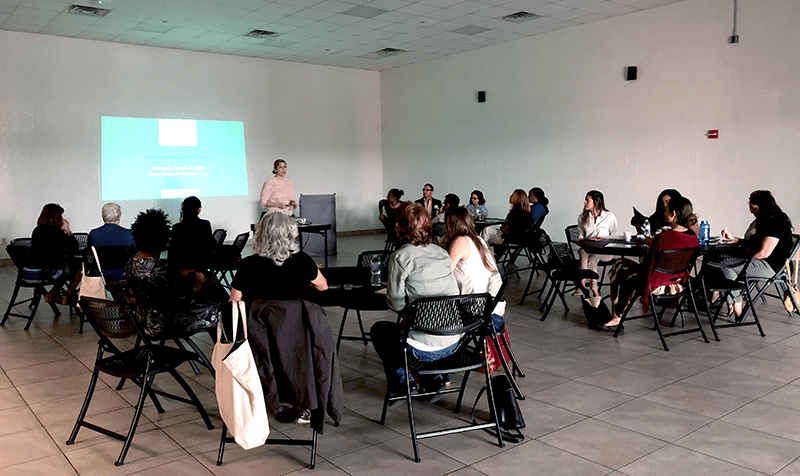
Image from May 23rd, 2018 Spring Cohort Meeting
Upcoming Events
During the Summer of 2020, Food for All Broward is meeting 1-on-1 with Broward County municipalities to review the 2020 Broward Food Policy Audit and discuss potential policy and systems change opportunities to support food access improvements in our communities.
Past Events
Dear Food for All Broward community,
Thank you for joining us at our virtual convening, Recovering and Building Resilience, on Wednesday, June 3, 2020.
During the convening, we reflected on the many ways that COVID-19 has impacted our food systems and our communities while highlighting and assessing examples of past and current emergency food response action in Broward County.
Together we helped identify ways in which Food for all Broward can continue to collaborate, support, and coordinate local and regional food system partners, in order to continue to sustain and help build a more resilient community.
Did you miss the convening? Access the convening recording or read the summary below:
Food for All Broward Spring Convening: Recovering and Building Resilience
Event Overview and Recap
Introduction
More than 80 people signed up for the Recovering and Building Resilience convening on June 3, 2020. The participants (52) represented a diverse group of people who are interested in food access including those who work in government, nonprofits focused on health, nutrition, and agriculture, and universities. Of the 41 people who participated in the polls, 22.5% work in government (staff and elected officials), 37.5% work for non-profits, and 10% were healthcare providers.
The convening began with a quick welcome and virtual housekeeping considerations. These were followed by a moment of silence for all the Black Lives being disproportionately affected by two important health crises: Covid-19 and Police Violence. Next, Urban Health Partnerships (UHP), the agency coordinating Food for All Broward (FFA) initiative introduced and provided an overview of the agenda and FFA.
Food for All Broward puts theory and evidence in action to help increase access to quality, healthy, and affordable foods through policy and systems changes that strengthen the local food system. This initiative has been funded by the Health Foundation of South Florida (HFSF) since the end of 2017; the second phase started in November of 2019. The goals of our initiative are to: Work with Broward County municipalities, communities, and leaders to support them in implementing policy and/or systems changes; develop and archive food access support tools, including Policy, Systems, and Environmental Change (PSE) strategies and language recommendations; and build sustainability for these efforts. This work includes convening leaders, experts, community, and implementers to share their expertise and encourage collaboration, supporting existing efforts, and coordinating among the partners working on food access, and more.
The Food for All Broward Framework
The Food for All Broward framework includes:
- Facilitating Interactive Convenings to bring community, leaders, and stakeholders together to share data, goals, challenges, and progress for food access improvements.
- Providing Technical Assistance to support municipalities in co-designing and implementing PSE strategies to improve healthy food access.
- Encouraging and supporting more formal municipal commitments to help build political awareness and action.
- FFA also monitors and evaluates these processes, methods, connections, and outcomes, thus providing a very helpful supportive structure for those engaging locally and regionally, in our food access efforts.
FFA has produced, in collaboration with at least seven Broward County municipalities, nine sample technical assistance tools to increase food access. Each of these provides policy and/or systems language and strategy recommendations for municipalities to implement.
Read more
The 2020 Food Policy Audit and Local Examples
As part of our technical assistance, the Food for All Broward team reviewed major land-use policy documents looking for food-related policies: Primarily Comprehensive Plans and Land Development Regulations in Municipal code. In some cases, we reviewed master plans such as a green or sustainability plan. There are 76 policies directly related to food access across 26 Broward County municipalities, including BMSD (i.e., unincorporated areas of Broward).The three top municipal units updated either their comp plans (Fort Lauderdale, BMSD, Miramar) and codes (Miramar) in the past three years to include more food access policies.
Lorraine Tappen, AICP, LEED Green Associate Principal Urban Planner with the City of Fort Lauderdale joined us to share about the city’s Comprehensive Plan policy of Enhancing Community Health and Food Access, FFA’s support and TA through this process, and how this policy has led to several changes in support food access improvements through land use. (You can find Fort Lauderdale’s Comprehensive Plan here on pg. 31).
Linda D. Whitman, RLA, Senior Planner with the City of Coconut Creek spoke about the work being done in their city through their City’s Green Plan, for which FFA supported with evaluation recommendations. Linda also shared about the resolution the city passed “to promote a healthy environment with food access and food security for all” to further highlight their commitment to food access work. (You can find this resolution on our website and request Food for All assistance to support passing a resolution tailored for your municipality’s goals and vision).
Food for All Broward’s Covid-19 Response Update
In response to COVID-19 FFA reached out to partners, elected officials, and other stakeholders to hear from you about your vision, challenges, successes, and ideas, particularly as they have been adapted to respond to COVID-19. We also started a facebook page and researched and developed a Covid-19 and food access resource list, which you can find on our website. We encourage everyone to use the facebook page to share your own resources and information about food access so we can continue to make connections and collaborate during this time and beyond.
The Food for All Broward Community
To get a better picture of the participants who attended the convening, we asked a few questions about their organizations, their work, and their involvement in food access efforts prior, during, and beyond the pandemic. Specifically, participants responded to three polls about the work they have been conducting: 59.2% have worked on direct food services (food distribution, food pantries, community gardens/urban agriculture, and food recovery and/or redistribution), 22.2% have worked on food support (food provision, education and support, funding for food, and food policy/standards), and 3.7% have worked on the commercial side of food access (retail, grocery, markets). As everyone responded to the polls, some partners were able to share briefly more about their work prior, during, and their vision or concerns for working through/after the pandemic.
The Existing Infrastructure and Making Connections for Recovery and Resilience
Food for All Broward is aware of several examples of existing infrastructures within our county and municipalities that participate in different ways in the procurement, provision, and or support of food access projects and opportunities around the county. By showcasing these examples, together we began to identify potential opportunities to support, join, or help coordinate these efforts and collaborate during and beyond COVID-19 and other emergency responses. The City of Sunrise shared information about their city-run food pantry and other related food and health access programs. Flipany shared about their contract with the City of Hollywood to support after school meal programs and how this type of relationship has helped leverage meal distribution dollars and opportunities during this time of the pandemic. The Children Services Council of Broward County and the Together 4 Broward Task Force led by Broward County Public Schools helped highlight additional county-level infrastructure that already helps coordinate food access regularly, but also especially during times of emergencies, like COVID.
Nurturing the discussion and making connections, the convening participants raised some ideas related to urban agriculture and its role in building a more resilient local food system. One of the ideas was to increase connections with local farmers, non-profits, and municipalities as a way to support local farms and urban agriculture regularly and to further activate these connections during times of food-stress in our communities. Some participants extended the conversation of urban agriculture into home-gardening and highlighted potential issues when HOAs limit a community’s ability to grow food at home. Finally, another participant raised the issue that despite schools having large spaces to develop urban agriculture projects, they are not permitted to actually serve what they grow. Having agriculture on school grounds could benefit communities and also teach students about agriculture and sustainability. These examples highlight potential opportunities for more connections and collaborations to support PSEs to help connect partners, increase urban agriculture opportunities, and establish these in long-term sustainable ways.
Making More Connections
A second poll was launched along with a discussion about coordination and sustainability. Respondents were asked what they viewed as the most applicable strategy to support food-related emergency response, recovery, and resilience. 23.8% said support for county-wide action-based initiatives was most needed. Some respondents would prefer connecting to existing emergency response systems (19%) and others prefer municipal-nonprofit/multi-sector collaborations (19%). 14.3% told us the most applicable strategy was working with existing councils, committees, or task forces.
When asked which strategies would support improvements in food access, 17.5% said they believe working with existing councils, committees or task forces would best support improvements and another 17.5% prefer using the Comprehensive Plan approach. Supporting county-wide action-based initiatives (15.8%) and municipal-nonprofit/multi-sector collaborations (15.8%) were also ranked highly.
While participants took the polls, we heard from the American Heart Association about what their work related food access during COVID-19, including community food distribution and working with Dania PATCH to distribute food vouchers. The Community Health Strategy team from YMCA shared information about their work around community health and their shift to conduct programs remotely. The Florida Hunger Coalition spoke about Summer Break Spot, the mobile school pantry, the coordination of an effort to help put together a searchable map for food resources during COVID-19, and implementing the USDA farm to the family initiative.
Pembroke Park Vice Mayor Clark spoke about the town’s response to COVID-19 and their food distribution program that was coordinated with Feeding South Florida. Pembroke Park has also started a food forest and a community garden, but COVID-19 has demonstrated how much food is needed to feed the community.
Building Action Towards a Resilient, Food Secure, Broward for All
The convening concluded with a discussion of next steps and a final poll about working together to ensure equitable healthy food access throughout the county. Participants were asked about the kind of activities that could more readily support and pursue the opportunities discussed during the convening. They ranked their preferred options:
In order to support the implementation of policy and systems changes, participants were asked to tell us about feasibility (willingness and capability) in their municipality or organization: 57.1% of respondents said that their municipality or organization is both willing and capable. 19% were not sure if their municipality or organization was capable, and 14.3% said their municipality or organization was willing, but not capable.
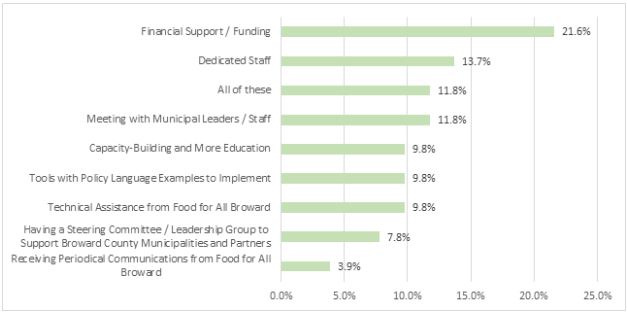
Resources
City of Fort Lauderdale: https://www.fortlauderdale.gov/departments/sustainable-development/urban-design-and-planning/comprehensive-plan
City of Coconut Creek: https://www.coconutcreek.net/sd/city-green-plan
Sunrise Food Pantry: Call center phone number is 954-746-3680. You can access information on any of our services by calling that phone number
Flipany: https://flipany.org/access-to-healthy-food
Children Services Council of Broward County: https://www.cscbroward.org/
Broward County Public Schools: https://www.browardschools.com/
Together 4 Broward Food Distribution Locator Map: https://www.broward.org/together4broward/Pages/default.aspx
Pembroke Park Community Garden and Food Forest: http://www.Maculelegarden.com/; communitygarden@pembrokepark.com
Food for All homepage: https://urbanhp.org/food-for-all-broward/#1513956185270-f61be10e-fca9
COVID-19 Resources: https://urbanhp.org/food-for-all-broward/#1584736303401-fb9e2152-3a83
Food for All Facebook Page:
https://www.facebook.com/groups/2567506773491054
Federal grant opportunity for urban agriculture projects: The application is due July 6. https://www.grants.gov/web/grants/search-grants.html?keywords=USDA-NRCS-NHQ-UAIP-20-NOFO0001013
Encourage Your Mayor to Sign the Pledge!
By making a public commitment to promote access to healthy foods, mayors can play an important role in increasing awareness and building momentum for policies and initiatives that can promote community food security, equity, health, environmental sustainability, job creation, and economic development. Your mayor can sign the pledge by clicking here or downloading the pledge and emailing it to arely@urbanhp.org.
To learn more about Food for All Broward, please visit:
https://urbanhp.org/food-for-all-broward/
Event Recap
The 2nd Annual South Florida Food Insecurity Summit
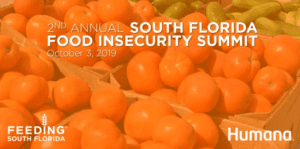 Thursday, October 3, 2019
Thursday, October 3, 2019
Co-hosted by Feeding South Florida + Humana
The 2nd Annual South Florida Food Insecurity Summit took a deep dive into the issue of food insecurity in South Florida, the resulting economic and health implications, and included solutions-driven break out sessions designed to collaboratively increase food access by strengthening the food system.
Food system-driven topics included:
Policy Solutions (Led by Urban Health Partnerships/ Food for All); Retail + Agriculture; Health + Wellness (Led by Humana); Technology (Led by Feeding America); Charitable Response
Food For All Broward Convening in Dania Beach
Wednesday, January 30, 2019
Building Economic Development Through Food Access
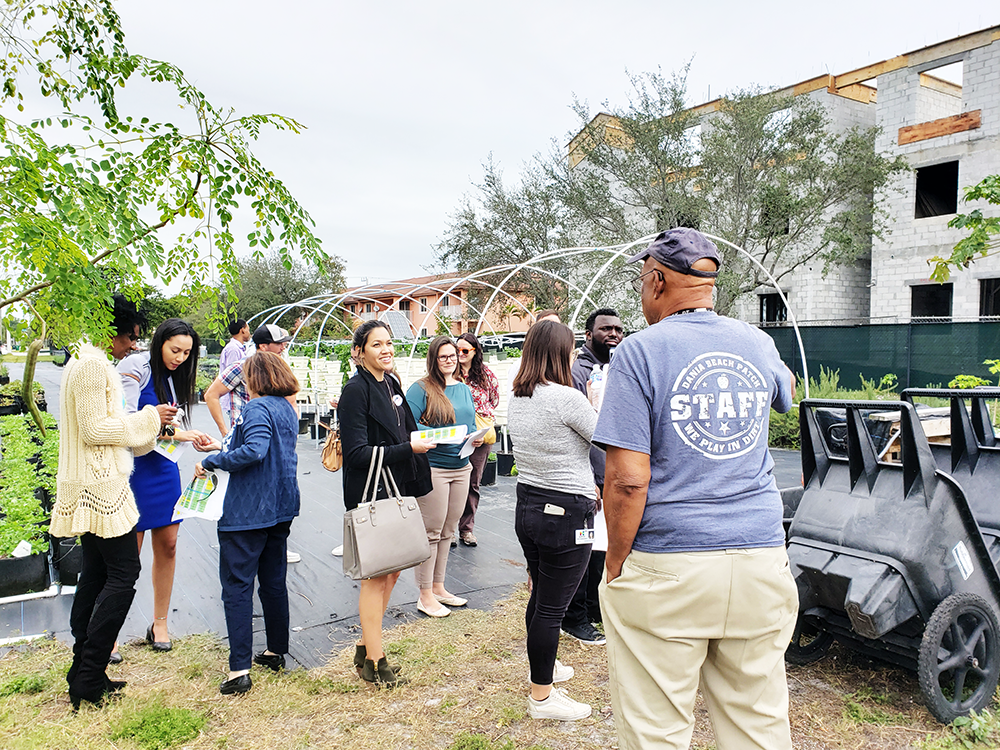
Food for All Broward Event Resources
Food for All Broward Kick-off Workshop Presentations 5/23/18
Spring Workshop Powerpoint Presentation
-Presentation on Municipal Food Policy Audit by Anthony Olivieri,
Food for Health, Environment, Economy, and Democracy (FHEED)
Food for All Broward Kick-off Workshop Presentations 1/18/18
Expanding Healthy Food Access in Your Community
Policies and Lessons from Across the Nation
Dwayne Wharton, Director of External Relations, The Food Trust
Elsi Rose, LEED AP, Development Management Coordinator, City of Miramar
Michael Alpert, AICP, LEED AP, Principal Planner, City of Miramar
Expanding Healthy Food Access in Your Community – Data
Anthony Olivieri, MURP, Founder, FHEED, LLC
Encourage Your Mayor to Sign the Pledge!
By making a public commitment to promote access to healthy foods, mayors can play an important role in increasing awareness and building momentum for policies and initiatives that can promote community food security, equity, health, environmental sustainability, job creation, and economic development. Your mayor can sign the pledge by clicking here or downloading the pledge and emailing it to arely@urbanhp.org.
To learn more about Food for All Broward, please visit:
https://urbanhp.org/food-for-all-broward/
January 29, 2019 Convening
July 2018 Convening
May 2018 Convening
January 2018 Convening
Resources
Food for All Broward General Resources
Food for All Broward Fact Sheet
Food for All Broward is an initiative to expand access to healthy foods for residents of all ages, abilities, cultural and economic backgrounds. By collaborating with local jurisdictions over the next year, the aim is to increase healthy eating options by co-developing policy and system changes that will facilitate healthier, thriving communities by strengthening and expanding the food system across Broward County.
Food for All Broward: Preventable Diabetes and Food Deserts in Broward County
Policy changes that make healthier foods more available, accessible, and affordable for vulnerable residents living in food deserts and high diabetes ZIP codes in Broward County could greatly curtail future cases of diabetes. This fact sheet from Food for All Broward presents findings from our analysis of the relationship between diabetes and food deserts in the County. The confluence of diabetes and food deserts is clear: The majority (68%) of the County’s food deserts are located within high diabetes ZIP codes. Food deserts tend to cluster within clusters of high diabetes ZIP codes, mostly between I-95 and the Turnpike. The findings suggest that communities face inequities, particularly a lack of access to healthy foods, that contribute to increased risk of diabetes.
Food for All Broward: 2020 Policy Audit Assessment Summary
In 2020, FFA added thirteen more municipalities (26 total) to the policy scan and changed the methodology. This time, we focused more on food-specific policies, eliminating the “allied policies” search. Several jurisdictions adopted robust food-specific policies, which bring the total number of policies to 76. For highlights on the 2020 Policy Audit Assessment Summary, please see the Food for All Broward: 2020 Food Policy Assessment Fact Sheet.
Food for All Broward: 2019 Policy Tools to Increase Food Access
Sample National Hunger Action Month Proclamation
Urban Agriculture & Farmers Market Sample Ordinance (Hallandale Beach)
Land and Park Use Elements Sample (Lauderdale Lakes)
FL Senate Bill Review and Opportunities (General)
Comprehensive Plan Review – Land Use Element (Lauderhill)
Economic Development and Comprehensive Plan Support for Food Access (Dania Beach)
Food for All Broward: 2017 Policy Audit Assessment
Food for All Broward conducted a policy audit to understand the existing food policy landscape in 13 of the Food for All Broward focus jurisdictions. Three general categories of policy documents were collected and analyzed for each jurisdiction: Comprehensive plans, Master Plans and/or CRA Plans, and Ordinances. This fact sheet provides a summary of the policy audit findings for each municipality.
Food for All Broward Technical Assistance
Through Food for All Broward, UHP can provide technical assistance to Broward County municipalities to develop and implement policies, systems, and/or social and built environment changes (PSEs) to improve access to healthy foods in their communities. UHP will work closely with municipalities to co-identify and co-develop evidence-based food policy and system changes that can successfully assist communities in closing healthy food access gaps, thus supporting community development, health, and wellbeing. Technical assistance can be requested at any time. Throughout the technical assistance process, recipients will receive public data, and/or GIS mapping, and other resources as back up for the selected healthy food PSEs. Communities may also find this information useful for their future grant seeking purposes. Free technical assistance may be available based on available grant funding. Request technical assistance today!
Request Support for a Proclamation or Resolution
Cities can pass a proclamation or resolution to show unified goals and purpose and plan to continue to improve food access. Please encourage your city commissioners and representatives to support and pass a proclamation or resolution in your city.
View a sample proclamation for September Hunger Action Month here.
View a sample resolution from Coconut Creek here.
Request support here.
Other Helpful Resources
The Food Trust
The Food Trust is a nationally recognized nonprofit that works with neighborhoods, schools, grocers, farmers and policymakers across the country to develop a comprehensive approach to improved food access that combines nutrition education and greater availability of affordable, healthy food. The website features useful fact sheets, case studies, videos and reports.
Good Laws, Good Food: Putting Local Food Policy to Work for Our Communities Toolkit (PDF)
This toolkit is geared towards local food policy councils and local food advocates—those who have identified a challenge or opportunity within their community’s food system and want to make an impact through policy change. The toolkit provides a starting place to understand the basic legal concepts surrounding local food systems, develop a base of knowledge about the main policy areas, and discover examples and innovations from other localities.
Healthy Food Access Portal
The Healthy Food Access Portal brings together the rapidly growing body of research, best practices, resources, and policy information for community members, practitioners, advocates, entrepreneurs, and others who are committed to ensuring that all communities have equitable access to healthy, quality, affordable food.
Healthy Food Policy Project
The Healthy Food Policy Project features a curated, searchable database of innovative local healthy food policies, a crosswalk of local laws and policies, organized by food system category and type of law, and case studies that showcase healthy food policy initiatives around the country.
Contact
Program Contact
To partner with Food for All Broward or for more information about the initiative, please contact:
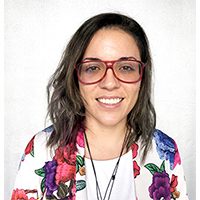
Arely B. Lozano Cantu: arely@urbanhp.org
Food for All Broward Network
Grant Opportunities
Here are some upcoming grants and funding opportunities that you may be interested in:
• USDA Food and Nutrition Service – Farm to School Grant Program – Apply by 1/8/2021
Relevant Details: To accomplish farm to school objectives that will be sustained in the long term. Funds support training, planning, developing partnerships, planting school gardens, field trips to agricultural operations, and other activities. Award: up to $100,000.
• Campbell’s Soup Foundation (Miami-only) – Apply by 1/15/2021
Relevant Themes: Increasing healthy food access; Encouraging healthy living; Nurturing Campbell neighborhoods. Award: up to $25,000.
• Cigna Foundation – Healthier Kids for Our Future, Food Insecurity Grant – Apply between late 1/2021-2/28/2021
Relevant Themes: Access to healthy meals and nutritional education outside the school setting; Food and nutritional programs for expecting mothers and caregivers; Health provider efforts that provide nutritional education to patients.
• Clif Bar Family Foundation – Small Grants – Apply by 2/1/2021
Relevant Themes: Protect Earth’s beauty and bounty; Create a robust, healthy food system; Build stronger communities. Award: $2,000 – $8,000.
• Aldi – Smart Kids – Apply between 2/1/2021-12/15/2021
Relevant Details: Programs dedicated to supporting the health and wellness of children in our communities, encouraging them to be active in education, physical activity, nutrition, socializing, and the arts. Award: $100-$5,000.
• Whole Kids Foundation – Garden Grant Program – Apply between 2/15/2021-3/31/2021
Relevant Details: Turn outdoor spaces into hands-on learning gardens that connect kids with food. Award: up to $3,000.
• Walmart Foundation – Access to Healthier Food – Rolling application
Relevant Themes: Hunger, Nutrition, Food Safety.
• Newman’s Own Foundation – Apply by invitation only
Relevant Focus Area: Nutrition: Organizations implementing model solutions to address fresh food access and nutrition education in underserved communities. Award: Average grant is $35,000.
Policy
• City of Fort Lauderdale: The City recently updated its policies in the Future Land Use Element of the City’s Comprehensive Plan. On page 31, you will be able to find the revised health and food policies. Did you know that Food for All Broward supported Fort Lauderdale with the development of these policies? Let us know if you’d like some assistance!
Environment and Systems
• The Town of Pembroke Park: Did you know that the Town’s Community Garden and Food Forest was designed with locals and neighbors in mind? Vice Mayor Clark and all the Town’s support team have dedicated to growing these urban agriculture efforts in ways that help mitigate the ill effects of food insecurity in the Town and the neighboring communities. You can learn more about their work by reading this article by Vice Mayor Clark himself.
COVID-19 Response
Click on the following bullets to learn more about some local municipalities and organizations going above and beyond to provide food and support for those in need during these difficult times:
- Chef Kulture is a grassroots collaborative of food industry experts who are currently preparing and distributing fresh hot meals to Broward and Miami-Dade people in need.
- Feeding South Florida is a leading agency providing immediate access to nutritious food through food distributions throughout the entire South Florida region.
- Flipany is a local nonprofit organization that is leading efforts to provide fresh healthy meals to children and families in need by creatively leveraging federal grant funds and school and after-school program relationships.
- City of Sunrise Pantry (Social Services) is housed under the City’s Leisure Department and provides regular assistance and services to older adults who need food access support and have expanded their efforts through the pandemic.
- Eat Well Exchange is educating youth and families about ways to grow food, eat healthier, be active, and about the importance of food security in fighting social determinants of health.
Do you want to get featured in the next newsletter or through our Facebook Group? Let Us Know What You Are Working On!
Follow Urban Health Partnerships on social media to stay up to date on upcoming events, news, and more.
